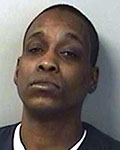Video Sponsor
.pane-node-body img {background: none !important; border: 0 !important; margin: 0 !important; padding: unset !important; padding-left: 1px !important }
broadstreet.zone(69076)
Samuel Blackshear
When Samuel Blackshear shot Nathaniel Wilson on Central Avenue one evening last May, Blackshear was exercising "street justice" Judge Charles Zambito told the young man today at his sentencing on an illegal weapon conviction.
It wasn't a matter of self-defense, as defense attorney James Hinman contended, Zambito said. The judge said he believed there was a prior dispute between Blackshear and Wilson, even before Wilson showed up with a knife and stabbed and killed Terry Toote, and that Blackshear knew a woman he was with had a gun and that he expected to be handed the gun if he needed it.
Blackshear was denied youthful offender status and sentenced to three and a half years in state prison followed by two and a half years on parole, which is the mandatory sentence for a conviction on a count of criminal possession of a weapon.
The father of Samuel Blackshear, who was 17 at the time of the incident, said he was disappointed that Zambito denied his son a chance to go to school, get a job, and try to get on a path toward a productive life.
"I came here today expecting justice for my young son," Billy Blackshear said. "I'm not trying to make excuses for him. I'm not saying that he was in the right for how he reacted, but considering the factors that placed him in that situation...with him being a young person, you have the influence of television, you have the influence of peers, you have so many negative influences that could have carried him even worse than the way he reacted and he did not."
Before sentencing Blackshear, Zambito meticulously reviewed the law, the criteria that must be met for a finding youthful offender status, and the circumstances of the case.
Many new details about the murder of Toote and the shooting of Wilson on Central Avenue on May 17 came out during today's hearing.
Youthful offender status is reserved for those cases, Zambito said, where there are mitigating circumstances and where the defendant may have acted in haste and thoughtlessly. The judge making a Y.O. determination must consider the gravity of the circumstances, the defendant's prior record, prior acts of violence, the reputation of the individual, whether the defendant cooperated with police and prosecutors, the defendant's attitude, and whether the defendant has displayed respect for the law.
Y.O. status is mandated if the perpetrator is between 15 and 19 years old at the time of the offense but the conviction is for a misdemeanor. In this case, Blackshear admitted to a felony.
If the case involves an armed felony, as this was, Zambito said, then mitigating circumstances come into play.
In their remarks to Zambito prior to Zambito discussing his decision, District Attorney Lawrence Friedman said there were no mitigating circumstances and dismissed assertions by the defendant's attorney, Hinman, that Blackshear acted in the defense of himself and others. Hinman passionately and exhaustively argued that there were mitigating circumstances and this his client did act in defense of himself and others.
Friedman argued that Blackshear, who had little experience, he said, with handguns, and no prior training in defending others, acted recklessly and without regard to the safety of others in the vicinity when he fired three shots at Wilson. After Wilson attacked Toote, he said Blackshear walked over to a nearby car, took a gun from the driver, and immediately turned around and started firing.
"That wasn't self-defense the first time he fired it," Friedman said. "It wasn't self-defense second time he fired it. It wasn't self-defense the third time he fired it. That was not self-defense."
If it was self-defense, Friedman argued, then why didn't Blackshear stick around after the shooting? Why did he flee instead of talk to the police? Why wasn't he cooperative with investigators once he was located? Friedman asserted the Blackshear has been unwilling to help police locate the handgun he used and that the gun is still missing.
Hinman argued that all available physical evidence, in particular, a video camera mounted on a utility pole on Central Avenue at the time of the shooting, shows Blackshear acted in defense of himself and others. He said it showed Wilson arrive on scene and within 10 seconds, attack Toote, kill him, and then immediately brandish the knife at other people in the area.
Other than his possession of the gun, Hinman said his client did nothing illegal. He suggested the other charges against Blackshear -- attempted assault in the first degree, assault in the second degree -- where satisfied in the plea agreement because Blackshear could have made a credible case to a jury that he acted within New York law to defend himself and others.
"Maybe he (Wilson) would have stabbed other people if he had not been shot," Hinman said. "That doesn't make Mr. Blackshear a hero but he stopped illegal acts."
As for Blackshear's leaving the scene of the shooting before police arrived, Hinman said that's the normal reaction of a black youth today.
"I would submit that a young black man in this day and age has a good reason to not stick around and talk to police," Hinman said. "Nor does he have the obligation to stick around and talk with police."
As for helping police find the gun, Hinman said his client told police that he handed the gun to a third party to take care of and that he has no direct knowledge as to the gun's whereabouts. He said that third party may have cooperated with police in locating the gun but since that person wasn't assured immunity from prosecution he hasn't cooperated. He did say police learned the gun may have been dropped from a bridge into a creek and a search was undertaken to try and locate the gun but it wasn't found. None of that, Hinman said, could be blamed on his client.
Hinman disputed statements Wilson made in a presentence probation interview where Wilson apparently asserted that Blackshear shot him because of a prior dispute and that Blackshear was looking for a confrontation with Wilson.
"It's nothing more than an attempt by Wilson to make himself a victim," Hinman said. "He's the one who set everything in motion."
Zambito, however, gave some weight to Wilson's account of the incident.
"I have no sympathy for Nathaniel Wilson," Zambito said. "He is convicted of murder and he is in jail for a long time, and deservedly so."
But, Zambito said, some of Wilson's statements are corroborated by the evidence on the pole cam video recording as well as mobile phone recordings by witnesses.
In order to find mitigating circumstances, Zambito said he would have to be convinced that Blackshear acted on the spur of the moment to defend himself and others but Zambito said the evidence suggested otherwise.
For example, well before Wilson arrives, a black sedan is seen on Central Avenue. At one point, the driver gets out and retrieves what appears to be a handgun from the trunk of the vehicle. Later the car leaves Central Avenue and returns. The car leaves again and reappears just before Wilson shows up. After Wilson stabs Toote, Zambito said, Blackshear is seen moving toward Wilson, who is turning to leave, and then sees the sedan and walks over to it and is immediately handed a gun by the driver of the vehicle.
"That tells me," Zambito said, "that he (Blackshear) was looking for that car and he expected to be handed the gun."
He said audio from mobile phones show that several people cried out "Sam," which Zambito took as a verbal attempt by witnesses to tell Blackshear to not fire any shots but that Blackshear fired anyway.
Wilson contends he and Blackshear had a prior dispute over Wilson hitting a girlfriend and that Wilson had tried to apologize and Blackshear refused the apology. He said even in a phone call earlier that day, Blackshear had refused the apology and hung up on him.
He said Blackshear had referred to himself as a member of the "L Gang" and that members of the "L Gang" would be looking for Wilson (outside of court, Friedman said "L Gang" may refer to a group of youths who grew up on Lewis Place and applied that moniker to themselves).
While acknowledging that Blackshear's natural impulse may have been to leave the scene and that he had no obligation to stay at the scene, his failure to do so did display a lack of cooperation with police, and one of Zambito's findings must include cooperation with police for Youthful Offender status. Further, Blackshear did not come forward voluntarily the next day. When he was located, he was at the residence of the adult who gave him the gun, playing video games.
As for Blackshear's criminal record and good conduct, Zambito said Blackshear had been arrested once, granted youthful offender status once, and was on probation at the time of the May 17 incident. He also said that Batavia PD and Sheriff's Office reported 26 negative contacts with Blackshear in the prior two years. He said Blackshear had been accused of shooting another person with a BB gun.
"And he's only 17 years old," Zambito said.
Citing district official at BOCES, Blackshear was characterized as having us vs. them attitude, of disrespecting authority, of hanging out with other youths who caused trouble.
In the presentence report, probation officers recommended against Y.O., and detectives Thad Mart and Kevin Czora, the lead investigators on this case, also recommended against Y.O. status.
"It was only by sheer luck that his reckless behavior didn't result in killing or seriously wounding a bystander," Mart wrote in his letter to the court.
Zambito said he took all of that into consideration in coming to his conclusion.
"The defendant attempted street justice," Zambito said. "He put at risk an entire neighborhood. Even Nathaniel Wilson recognizes the loss of life in this incident was over something very senseless and I have to agree with him. I have to believe this defendant was complicit."
Billy Blackshear said his son was raised well, as the grandson of a beloved local pastor, the late Reverend Oraid Blackshear of Mount Zion Missionary Baptist Church on Ellicott Street, and as the son of a man who has never been arrested or spent a night in jail.
But outside court he said he can't help but wonder if he did enough to prepare his son for dealing for life in today's society.
"As a parent, I wish I would have done more," Billy Blackshear said. "I think that's something that maybe a lot of parents say when bad circumstances happen. I said the same thing about my brother when he passed. I wish I could have had a chance to say goodbye to him. I wish there were words that I could have said to him had I known that would be the last time I saw him.
"I didn't get that chance and I feel that same sense of sadness and remorse in this particular case. I wish I could have spent more time or that I could have done or something, or something I could have said that would have better prepared him for such horrendous circumstance."
There's a lesson in this case for all of us, Billy Blackshear suggested.
"I think that young people are too busy being raised and being influenced by outside forces that gave other people monetary value," Blackshear said. "You know there's money to be made on telling kids you should be this way, to have a violent attitude, or look at, you know, you don't have to listen to the rules or anything like that. I'm not saying that's what Samuel was influenced by (that) but I'm saying that there is more negative input than ... positive.
"And so we as parents have to step up. I think the system has to step up as well. Hand-in-hand cooperate in order to be a counterbalance to the things that are steering our young people into the feeling hopelessness and anger and just frustration. We need to start putting hope back inside these young people. We need to start giving them better options. We could do more. There's always more that can be done." (View the full video at the top of this story for all of Mr. Blackshear's comments after the hearing.)
Zambito thinks it's time for Samuel Blackshear to step it up and use his time in prison to take advantage of programs that will help him be more productive and move his attitude away from "us vs. them."
"If you don't," Zambito said, "you're either going to spend a lot of your life in jail or you're going to wind up dead like Terry Toote."


























